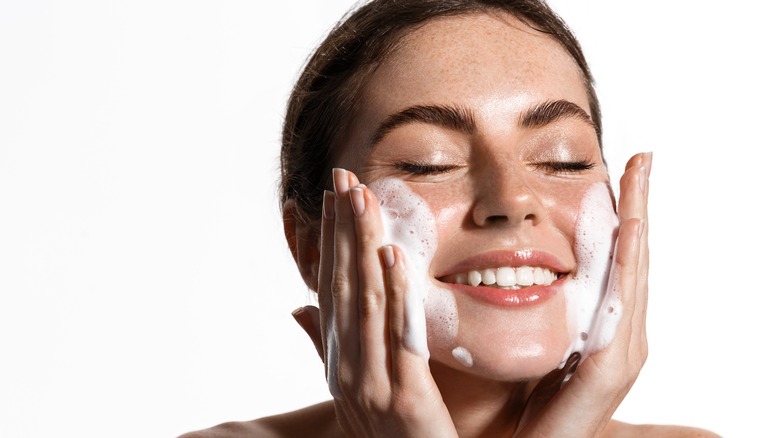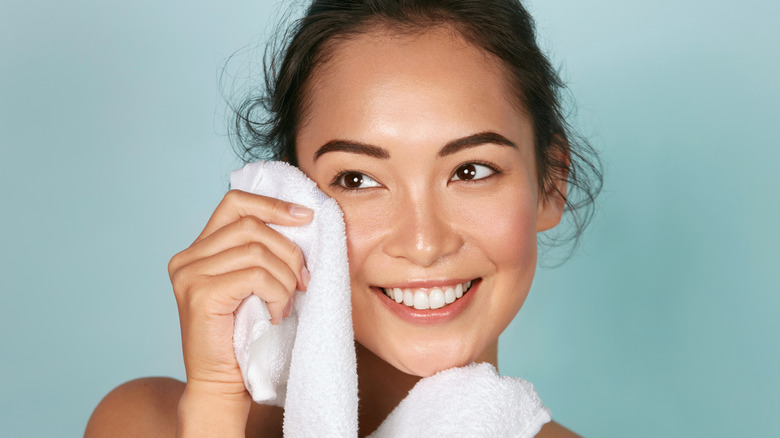A Celebrity Aesthetician's Foolproof AM And PM Skin Cycling Routines
TikTok is a hotbed for beauty routines that can end up doing more harm to your skin than good. Just in 2022, we saw people using "pore vacuums" — literally vacuuming the dirt and oil from your skin and hydrocolloid bandages, which were supposed to help treat acne (via Insider). Unfortunately, neither of these viral beauty trends are actually helpful according to dermatologists.
One trend beauty influencers and skin care experts do agree on is how effective skin cycling is. Whether you're a beginner to skincare in general or skin cycling, the good news is skin cycling is a really easy beauty routine to follow. Started by Dr. Whitney Bowe, skin cycling is a four-day rotation of using an exfoliant, retinol, and then having two nights of recovery (via Allure). "The world of skin care was becoming overly complicated," Dr. Bowe told Allure in an interview. "I saw the need to streamline the skin-care routine of my patients to optimize their skin health."
When we asked Amy Peterson, a medical aesthetician and the founder of Miami-based Skincare by Amy Peterson, about the benefits of skin cycling, she echoed Dr. Bowe, explaining the process, "allows the skin to take advantage of active ingredients without overdoing it and causing irritation." As tempting as it is to try out all of the new skincare products on the market, taking a minimalistic approach is what dermatologists and aestheticians say will give you the best results.
This is the best time of day to skin cycle
Taking care of your skin can be handled the same way you take care of your body: through following a routine. Despite the incessant slew of new products hitting the market and promising miracle cures in a bottle, Dr. Sam Bunting says that simple consistency—even more-so than product choice—is the key to beautiful, healthy skin (via Vogue).
Across social media, Bunting told Vogue they had seen beauty influencers doubling up and face cleansers, washing off long-wear foundations not just with a balm cleanser, but also with an acid-based toner. This combination of active ingredients can cause skin irritation and clogged pores—the very thing skin cycling avoids.
Deciding how and when to skin cycle can be a little confusing, however. When we asked medical aesthetician Amy Peterson about the when's and how's of the beauty routine, she told us that skin cycling can be used during the day or at night. She added her personal preference was cycling at night, since it's best to use stronger products like exfoliants and retinol at night.
But there are benefits to doing certain parts of your beauty routine at night versus the morning, depending on your lifestyle and skin type.
Yes, you should wash your face in the morning and at night
No matter whether you decide to cycle the rest of your products at night or in the morning, there's one thing you need to do every day, twice a day: wash your face. If you skip out on using a cleanser in the morning and at night, you run the risk of letting dirt and products start to build up, which can lead to breakouts. For some skin types, using a cleanser in the morning and rinsing your face with water at night may work best, per well+good.
Washing sleep off of your face is just as important as washing off the dirt and makeup of the day. "When you sleep, your face is rolling around in the sheets with oils from your hair, dead skill cells from your body, bacteria, saliva, and all of that needs to be washed off before applying your morning regimen," Rachel Nazarian, MD, FAAD, a board-certified dermatologist told Byrdie.
When we asked medical aesthetician Amy Peterson what cleansers she recommended, she told us Forlle'd Hyalogy P-effect Clearance Cleansing or Forlle'd Re-Pureance Wash work great as daily cleansers. Peterson adds Aveeno Ulta Calming Foaming Cleanser is also great if you're looking for a drugstore alternative.
Pro tip: be careful what temperature you're washing your face in. According to Shereene Iridiss, an NYC-based dermatologist, using hot water can be just as harmful as not washing your face (via Brit + Co).
This is when you should exfoliate according to your skin type
Whether you should follow your skin cycle routine in the morning or at night could depend on your skin type and your beauty routine. According to the Derm Collective, if you wear makeup or have sensitive or dry skin, cycling your chemical exfoliant at night can help wash away any residual product your cleanser might've missed and lets your moisturizer soak in while you sleep.
If you're someone who finds physical exfoliation something that leaves your skin feeling softer and smoother, it's best to use cycle these products in the morning, per Byrdie. Your overnight products, like glycolic acid or retinol, will have helped loosen up dirt, oil, and dead skin, making mornings the most beneficial time to use an exfoliator scrub.
Make sure you rush to put your next product on after you've rinsed and dried your face, though. After you put on that first post-exfoliating product, leave three to five minutes in between putting on each product to give your skin time to soak up each product.
When we asked medical aesthetician Amy Peterson what daytime products she recommended, she told us to use Forlle'd Platinum Lotion as a toner, MRB Eyecare Firming Concentrate for an eye cream, and to apply Glytone Age Defying C+ Advanced Antioxidant Serum under a light moisturizer — like Augustinus Bader The Cream — and sunscreen. She recommends Alastin Hydratint Pro Mineral SPF.
Moisturizer is an important part of your skin cycling routine
Just like washing your face, moisturizing is a step of your skincare routine that should not only not be skipped—even if you have oily skin—you should use moisturizer twice a day. Depending on what your skin care needs are, while it's possible to use the same moisturizer at night and in the morning, there are some key differences in night versus day moisturizers.
As Amy Peterson suggested above, the best daytime moisturizer is something lightweight that is comfortable to wear under makeup. Sometimes you can also find a daytime moisturizer that already has SPF in it, cutting down on the amount of products you need to apply first thing in the morning, per Forbes. These products also often contain antioxidants, which can help protect your skin against sun damage and pollution.
If you're cycling exfoliating and retinol products at night, Dr. Jeannette Graf, a board-certified dermatologist, told Shondaland she recommends finding a night moisturizer "that is richer in texture and formulated with more occlusives to lock in hydration." This not only helps replenish your skin after a long day of sunlight and pollution, with how harsh the active ingredients in exfoliants and retinols can be (not to mention photosensitive), using a more powerful moisturizer at night can help support your body's natural repair and replenish process.




